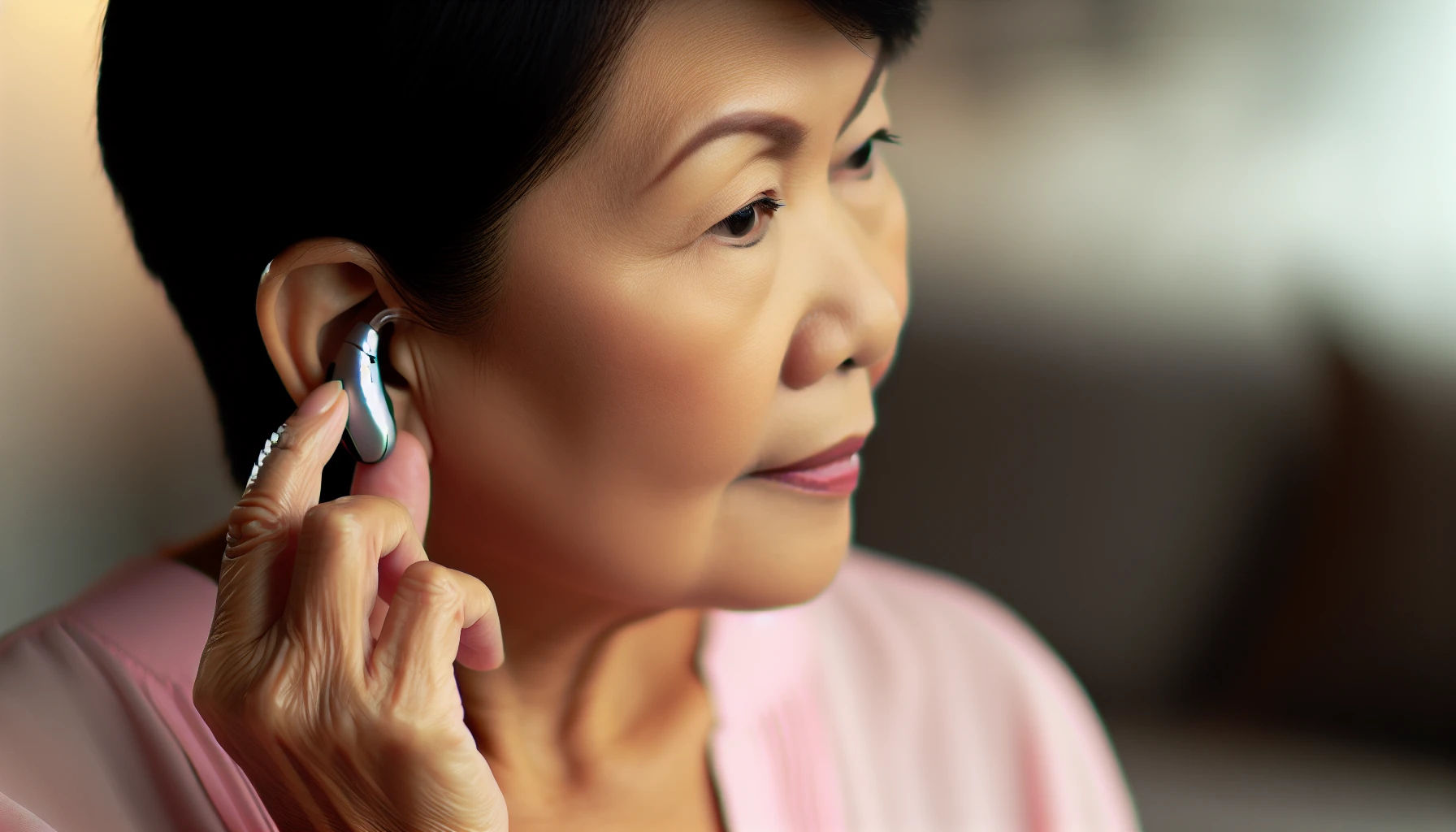Imagine sitting in a quiet room, trying to focus on a task, but all you can hear is a constant ringing in your ears. You may be experiencing tinnitus, a common yet often misunderstood condition. In this blog post, we’ll explore tinnitus, its causes, and the various ways to manage and treat it, providing valuable insights for those who suffer from this persistent ear ringing and answering the question, “does tinnitus go away?”
Key Takeaways
- Tinnitus can vary in duration, from temporary to chronic and may be caused by a variety of factors.
- Treatment options include hearing aids, sound therapies such as masking and habituation therapy, lifestyle modifications like stress reduction and avoiding loud noises.
- Research is ongoing for more effective treatments with the expectation of improved quality of life for tinnitus sufferers in the future.
Understanding Tinnitus: Will It Go Away?

Tinnitus is a subjective, constant sound, such as ringing or buzzing sound, heard in the ear canal. It manifests as phantom tinnitus sounds of varying pitch, loudness, and duration that may be heard in one or both ears and in the head. The primary cause of tinnitus is typically attributed to:
- Damage of the hair cells in the cochlea
- Earwax accumulation
- Age-related hearing loss
- Exposure to loud noises
These factors can contribute to the onset of tinnitus.
Musicians, construction workers, and airport ground staff are exposed to loud noises more often than others. This makes these professions more prone to tinnitus. According to a 2001 report from the Centers for Disease Control (CDC), approximately 13% of children aged between 6-19 were estimated to have noise-induced hearing loss. This could result in tinnitus or be a contributing factor to its onset.
Temporary vs. Chronic Tinnitus
Tinnitus can be temporary or chronic. When tinnitus persists for a period of three months or more, it is deemed chronic. Severe tinnitus can lead to considerable stress, difficulty focusing, and lack of sleep. The progression of chronic tinnitus is unpredictable, and in some cases, the symptoms may worsen over time.
Pulsatile tinnitus is a subtype of tinnitus wherein an individual perceives the sound of their heartbeat inside the ear. It is recommended to consult a clinician if one encounters any new pulsatile tinnitus. This is because in rare cases it could be indicative of a tumor or blood vessel damage. In such cases, an MRI or CT scan may be necessary to assess for potential abnormalities.
Factors Affecting Tinnitus Duration
Several factors may influence the duration of tinnitus, such as age, underlying health conditions, and exposure to loud noise. Research suggests that older individuals may be more likely to experience tinnitus for extended periods. Underlying health conditions, such as diabetes, high blood pressure, and thyroid disorders, can also potentially influence the duration of tinnitus.
Prolonged exposure to loud noise can lead to chronic tinnitus, resulting in a longer duration of the condition. Understanding and addressing these factors can aid in better managing and treating tinnitus in individuals who experience it.
Treatment Options for Tinnitus

Treatment options for tinnitus vary depending on its cause and severity. If tinnitus is determined to be caused by middle ear infections, a physician may recommend treatment with an antibiotic to prevent the infection from worsening tinnitus. Addressing age-related hearing loss through hearing devices can often reduce the symptoms of tinnitus, and in some cases, it might even disappear entirely.
Behavioral strategies and sound-generating devices are considered the most efficacious approaches to managing tinnitus. Unfortunately, tinnitus cannot be effectively treated with over-the-counter substances or herbal remedies. Research has found these approaches generally lack efficacy. Consulting a clinician to determine the appropriate treatment for your specific case is advisable.
Hearing Aids and Sound Therapy
Hearing aids and sound therapy can be beneficial in managing tinnitus symptoms, particularly for individuals with tinnitus resulting from hearing loss. These devices provide external sounds that can effectively mask or cover up the internal sounds of tinnitus, offering relief to those affected.
There are two main sound therapies used as tinnitus treatments: masking and habituation therapy. Cognitive Behavioral Therapy (CBT) is another approach that utilizes cognitive restructuring and relaxation strategies to modify the way individuals perceive and react to tinnitus, significantly reducing the distress caused by tinnitus and improving quality of life.
Tinnitus Retraining Therapy (TRT)

Tinnitus Retraining Therapy (TRT) is a form of therapy that seeks to retrain the brain to no longer be aware of the sounds of tinnitus. Sound generators, proven effective in cortical reorganization, play a significant role in TRT with a goal to reduce tinnitus symptoms.
Maintaining an environment filled with sound can assist in managing tinnitus during sleep. Maskers, generating white noise, help in concealing the issue, whereas sound generators provide a customized, low-level sound proven effective in cortical reorganization to alleviate tinnitus.
Lifestyle Changes for Tinnitus Management
Implementing lifestyle changes can help manage tinnitus. Stress reduction, avoidance of loud noises, and sufficient sleep may aid in tinnitus management. Neck exercises, shoulder shrugs, shoulder rolls, neck rotations, head tilts, head nods, jaw opening, chin tucks, progressive muscle relaxation, jaw stretches, and hot and cold water exercises are recommended for tinnitus management.
Lowering caffeine consumption might affect tinnitus severity, however, the research in this area lacks definitive conclusions. For specific advice, speaking with a healthcare professional is advisable.
Preventing Tinnitus Worsening

Unmanaged tinnitus symptoms may progress and make tinnitus worse, leading to further health complications, decreased focus, communication difficulties, poor sleep quality, chronic exhaustion, anxiety, stress, or depression. Although there is no foolproof way to prevent tinnitus, risk reduction might be possible through regular hearing tests, avoidance of loud noises, and stress management.
Alcohol consumption can exacerbate tinnitus, as it causes the blood vessels to dilate, thus amplifying the sounds experienced. If you are regularly exposed to loud noises, utilizing protective devices like earplugs, earmuffs, or customized devices is advisable.
Tinnitus and Underlying Health Conditions

Tinnitus can be associated with various underlying health conditions. Hearing loss, ear infections, and Meniere’s disease have been identified as potential underlying health conditions associated with tinnitus. Ménière’s disease is a disorder of the inner ear that typically affects hearing and balance, and can cause vertigo and tinnitus, often accompanied by a feeling of fullness or pressure in the ear, and usually only affects one ear.
Ear infections can also contribute to tinnitus, as the inflammation or accumulation of fluid caused by ear infections can impede the auditory pathways, resulting in the sensation of ringing in the ears. High blood pressure has also been linked to tinnitus.
When to Seek Medical Help for Tinnitus
It is recommended to consult a medical professional if tinnitus is accompanied by other symptoms such as dizziness, hearing loss, or changes in vision. Continuous, high-pitched ringing in one ear, anxiety or depression, and other phantom noises such as buzzing, roaring, clicking, hissing, or humming in the ears are severe symptoms of tinnitus that require immediate medical attention.
If there is a notable change or worsening of tinnitus symptoms, it is recommended to seek medical assistance, as this may be indicative of an underlying disorder. Furthermore, severe tinnitus can result in emotional distress; hence, addressing the condition and seeking a healthcare professional for an accurate diagnosis and suitable medical attention is significant.
Coping Strategies for Living with Tinnitus
Various coping strategies can help manage tinnitus, such as:
- Relaxation techniques: progressive muscle relaxation, neck exercises, yoga, and stress management can help reduce tinnitus symptoms.
- Distraction techniques: sound therapy and directed attention may prove effective in managing tinnitus by altering a patient’s perception of the ringing sound and providing a beneficial distraction.
- Support groups: joining a support group can provide emotional support and helpful tips from others who are also dealing with tinnitus.
Several support groups exist for individuals living with tinnitus, providing a sense of community and understanding for those affected. Resources like the American Tinnitus Association (ATA) website, Treble Health, and charitable support organizations help find tinnitus support groups, offering interventions and support for managing tinnitus.
The Future of Tinnitus Research and Treatment
Presently, tinnitus research is concentrating on assessing potential benefits of magnetic or electrical brain stimulation. The focus of tinnitus research and treatment is the development of new therapies that could provide relief for affected individuals.
At present, personalized bi-sensory stimulation, a combination of acoustic and electrical stimulation, and the use of a bimodal neuromodulation device are being explored as potential treatments for tinnitus. As research progresses, we can hope for even more effective treatment options for tinnitus sufferers in the future.
Summary
In conclusion, tinnitus is a common yet often misunderstood condition, characterized by persistent ringing or buzzing in the ears. While there is no guaranteed method of preventing tinnitus or a one-size-fits-all treatment, understanding the factors that contribute to tinnitus and exploring various treatment options can help manage the condition and improve quality of life. By consulting a healthcare professional, seeking appropriate treatment, and making lifestyle changes, individuals suffering from tinnitus can find relief and regain control over their auditory environment.
Remember, you don’t have to suffer in silence. Reach out to a healthcare professional, explore treatment options, and connect with support groups to help manage your tinnitus and live a happier, healthier life.
If you enjoyed this article, please take a moment to visit our site, Ear to Hear Online.
Frequently Asked Questions
What really helps tinnitus?
Preventing and minimizing tinnitus, medications, auditory habituation or retraining therapy, acoustic therapy, music therapy, amplification, neuromonics desensitization protocol, counseling or cognitive-behavioral therapy, white noise machines, reducing alcohol, caffeine, and nicotine intake are all effective ways to help manage tinnitus.
How long does tinnitus last on average?
On average, tinnitus typically resolves within 6-12 months after onset. Longer lasting cases may diminish over time, even if they persist beyond this period.
How can I calm down my tinnitus?
Try using a white noise machine to mask the noise, or listening to soft music or low-volume radio static. You may also benefit from hearing aids, cochlear implants, maskers, medications, tinnitus retraining therapy, counseling, and relaxation. Additionally, limit your intake of alcohol, caffeine, and nicotine.
Will I have tinnitus for the rest of my life?
For the majority of people, tinnitus is a temporary symptom caused by excessive noise exposure. However, some people may experience it as a long-term or permanent symptom.
Signs that tinnitus is going away?
Signs that tinnitus is going away include decreasing volume of ringing or buzzing sensations, improved pressure in the ears, less bothersome symptoms, better sleep and relaxation without interference. In some cases, the ringing may only last for a few hours or days.


